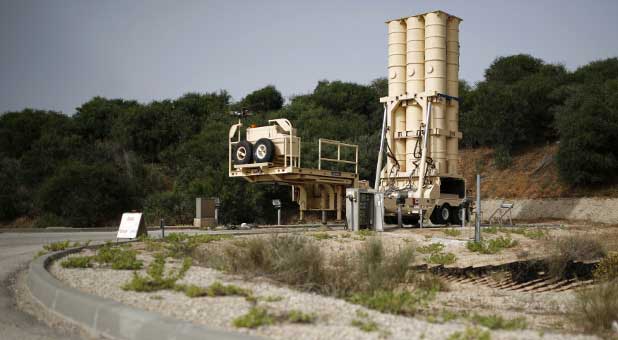Israel will prevent the S-300 anti-aircraft missile battery from becoming operational in Syria, National Security Adviser Yaakov Amidror told European Union ambassadors in Israel.
Amidror’s strong message, delivered in a briefing to all 27 EU ambassadors last week, bolstered Defense Minister Moshe Ya’alon’s statement earlier this week that Israel would “know how to act” if Russia goes ahead with its plan to provide Syria with the S-300 system.
Israel’s vow to act against the fearsome weapons system come as Syrian President Bashar al-Assad was quoted on Thursday as saying that his country had already received the first shipment of the S-300 system from Russia.
“Syria has received the first shipment of Russian anti-aircraft S-300 rockets,” the Lebanese newspaper Al-Akhbar quoted Assad as saying in an interview due to be broadcast later in the day. “The rest of the shipment will arrive soon.”
The Prime Minister’s Office declined official comment on Amidror’s statement to the EU ambassadors.
Earlier this week, Strategic Affairs Minister Yuval Steinitz said Israel viewed the S-300 as an offensive weapon, given that its 200-kilometer (125-mile) range would threaten Israel Air Force planes within Israeli airspace, undermining Israel’s aerial superiority in the region. Steinitz also said the S-300 would endanger commercial aircraft flying in and out of Ben-Gurion International Airport near Tel Aviv.
Steinitz met with Russian ambassador to Israel Segei Yakovlev on Thursday morning. According to Steinitz’s office, they discussed bilateral matters and strategic issues. It was not immediately clear if the Steinitz-Yakovlev meeting was directly related to Assad’s annoucement that he had already received the weapons system.
According to an Israeli diplomatic official, Amidror delivered his message during a discussion he had with EU ambassadors to clarify Israel’s positions on numerous matters and provide a situational assessment from the point of view of the Prime Minister’s Office. Such discussions are held periodically.
Amidror’s statement about the S-300 system came as he talked about Israel’s efforts to prevent security deterioration in the region in light of the civil war in Syria and Russia’s declaration that it would fulfill a contract to provide the Assad regime with the S-300 system.
U.S. State Department spokeswoman Jennifer Psaki on Wednesday reiterated Israel’s right to defend itself.
In an interview that was set to be released by the Hezbollah-linked al-Manar television station on Thursday, Assad reportedly stressed ties between his forces and Hezbollah fighters now openly operating on the Syrian side of the Lebanese-Syrian border.
“Syria and Hezbollah are part of the same axis,” he was quoted as saying.
“The Syrian army is the one fighting and leading the battles against the armed group, and this fight will continue until all those who are called terrorists are eliminated.”
Assad also said he would permit groups to launch attacks against Israel in the Golan Heights. Israel took control of the Golan from Syria during the Six-Day War in 1967. The border has been largely quiet since the May 1974 disengagement agreement following the October 1973 Yom Kippur War.
“The Syrian government will not stand in the way of any Syrian groups that want to wage a war of resistance to liberate the Golan,” Assad was quoted as saying.
Hezbollah has stated it would be willing to support groups that chose to launch operations in the Golan.
On Wednesday, Syrian Foreign Minister Walid al-Muallem told the Lebanese television channel Al-Mayadeen that Israel would face immediate retaliation if it were to attack Syria again. In recent months, Israel has reportedly launched several airstrikes in Syria against shipments of weapons destined for Hezbollah in Lebanon.
Muallem said Assad would remain president of Syria at least until elections next year and that he might seek another term.
Syria’s foreign minister also said that an international solution to the Syrian civil war would have to be put to a referendum in Syria.
Meanwhile, Prime Minister Benjamin Netanyahu met on Wednesday with U.S. Senator Robert Menendez, the chairman of the Senate Foreign Relations Committee. Netanyahu thanked Menendez for a bill the senator proposed that expressed support for Israel against the Iranian threat.
“Senator, I would like to welcome you as a great friend of Israel,” Netanyahu said. “You did it again. Your bill supporting Israel against the Iranian nuclear threat was passed by an amazing majority, I think 99 to 0. Very few people can accomplish something like that and it’s the second time you’ve done it, because you’ve also had the important sanctions bill. And we know that you stand with us, as do the American people and the American government, the American Congress, against the greatest security threat of our time, which is Iran’s quest for nuclear weapons.”
Menendez said, “For 20 years, as a member of the House of Representatives and the Senate and now as the chairman of the Senate Foreign Relations Committee, I’ve always asked two questions in terms of the U.S. foreign policy abroad: What is in the national interest of the United States? What is in the national security interest of the United States? And the answer to those questions, for myself, I’ve always dictated my views, my advocacy and my votes.
“And for 20 years, I’ve answered that question as it relates to the Middle East that it’s in the national interest and the national security of the United States to have a strong, unwavering relationship with the State of Israel — a true democracy in a very tough part of the world; a major security ally of the United States; a major trade partner of the United States; and a country most likely to be voting in common cause with us in international parts.”
For the original article, visit israelhayom.com.











































